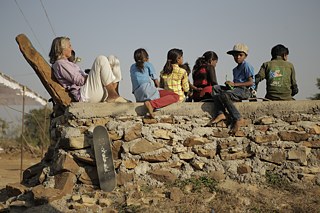Skateboarding for Change in India
Finding a new identity

Ulrike Reinhard has disrupted life in the village of Janwaar and proven a force for positive change. The skatepark she and skateboarders from around the world have built has given the whole village, and especially the kids and young people there, a new lease of life.
By Holger Schäfer
Deep in this Indian province, Ulrike Reinhard has found her mission in life. Just a few years back, life in Janwaar, a tiny village in Madhya Pradesh, was regulated by the strictures of the caste system and the lives of the village kids were preordained by immutable tradition. Even the school – if the kids attended it at all – couldn’t offer any fresh perspective.
Born and raised in Heidelberg, Germany, Ulrike has known the Panna district for quite some time. She’s been a frequent traveler in India ever since her first visit in 2012. Her idea was to see things change here, to set change in motion – only not through any of the usual top-down approaches but change that was driven by the people themselves. Change through play and not obey.

Right from the word go it was very clear to Ulrike Reinhard that this was not about skateboarding for skateboarding’s sake - simply because the skatepark was a place where people from different castes were on an equal footing with one another. It took a quite a while before that was accepted and the skatepark was embraced by everyone. Only now the skatepark is the epicenter of the village. “It has given the villagers a new identity, something they are proud of,” says Ulrike.
Two rules for success
The changes the skatepark has brought about are clear for all to see and quite remarkable. Caste is no longer a significant issue in the kids’ daily lives. And through a clever move on Ulrike’s part, school attendance has gone up by leaps and bounds among the youth of the village – since only those who go to school can also go skateboarding. The other golden rule is “Girls First” which means that girls will always get a board first.
Beyond skateboarding
Besides skateboarding Ulrike also organizes “learning labs” and workshops to discover and unleash the hidden talents and interests of the kids. The projects she has initiated cover a wide area of disciplines from theatre, video, art and photography to engineering. These projects are led by “professionals” from around the world whom she invites to come to Janwaar and live and learn with the kids.

Every year about ten volunteers come to stay in Janwaar. “The broad range of skills and abilities they bring with them is crucial for enabling the kids to discover their talent and give their imaginations free flow”, Ulrike explains. One of the older boys, for instance, not only had great fun while skateboarding but also found his passion for clay modeling. One day he showed up with a precise model of the skatepark in clay. He still takes care of the family buffalos, says Ulrike, but the joy he finds in modelling has put a smile back on his face.
Travelling to Europa and China
You can instantly sense that Ulrike Reinhard is really in her element when she’s talking about Janwaar. A graduate in economics, she used to work as a freelance consultant and author. Now she spends the greater part of each year with the kids in Janwaar.
She and her team also organize excursions for the children. Like to the Literature Festival in Jaipur, some 700 km away, where for the past three years kids have been taking part in a theatre program which has opened up a completely new world for them. During a two week program they write their own theatre play, rehearse it and perform it on various stages during the festival.

For Asha the skatepark and everything associated with it has certainly been a life-changer. As she says in Ulrike’s book REMOTE. The Rural Changemakers of Janwaar, “I’m not afraid of people any more. Girls in the village get married very early. Because of skateboarding I will not get married at an early stage”. Asha is now one of the best girl skateboarders in Janwaar. She recently won a competition at the Skateboarding Academy in Delhi and in October 2018 took part in the World Skateboarding Championships in China.
Janwaar leads the way
The success story of the skatepark soon went viral. Various NGOs and private individuals and institutions from all over rural India are now replicating the Janwaar model. Ulrike and her team try to help them as much as they can. Two parks – in Rajasthan und Andhra Pradesh – are finished, two more are currently under construction.